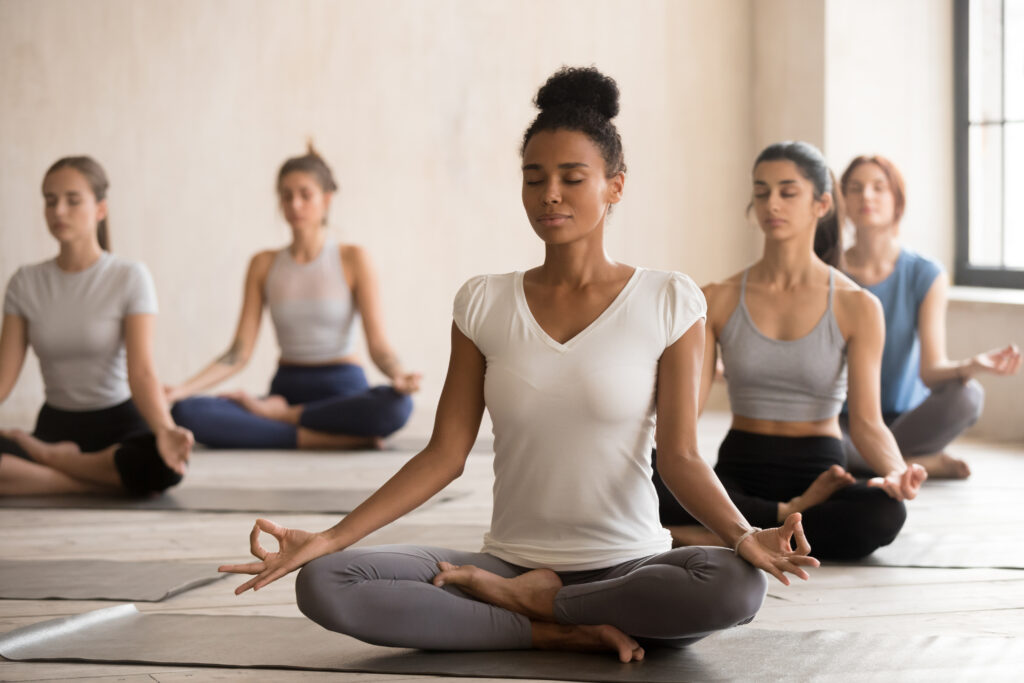
Everyone has probably heard the term mindfulness before. But what is mindfulness actually? The official "what is mindfulness" definition states that it is the conscious awareness of thoughts and feelings.
We spend most of our time dealing with everyday things and problems. Our thoughts are not in the here and now, but wander off. What is mindfulness and what does it do? Being mindful means being aware of the present moment without judgment.
What effect does mindful behavior have? Experienced stress is better processed. Your mental and physical health improves when you are mindful and caring towards yourself.
What is mindfulness? Have you ever asked yourself the question, what is mindfulness? Being mindful means perceiving every moment consciously and without judgment.
How does mindfulness influence your daily life? You make the decision to focus your attention on the present and not to mentally wander off.
A moment only lasts a few seconds. By concentrating on your own feelings and thoughts, you become aware of your emotions.
The importance of mindfulness in daily life is often underestimated. However, most of the time we are not mindful, but preoccupied with other things or problems. What we experience is not viewed objectively, but evaluated individually.
Mindfulness is the art of staying in the here and now and experiencing the present consciously but without judgment.
What are the benefits of being mindful in the here and now? What is mindfulness and why is it important? The principle of mindfulness is easy to explain. The present moment is the only moment in which you can consciously influence events and experiences.
Living in the present moment is therefore an essential aspect of shaping your life. Your thoughts influence your feelings and your actions. What is mindfulness and how does mindful behavior help in everyday life?
The power of the present moment is irretrievable. Use the energy to take action and make decisions. Don't wait for special opportunities, but benefit from the present moment.
In unfavorable situations, people often tend to cling to the past or glorify the future. Mindfulness teaches you to be in the here and now. Consciously perceiving the moment brings you back to reality.
Mindful behavior offers the opportunity to organize thoughts and feelings. Observing without judgment helps to find solutions and counteracts stress.

Are you one of those people whose daily routine is filled with numerous obligations? Do you hardly have time to take a deep breath and focus on your well-being? What is mindfulness for you and how could you be more mindful in your everyday life?
There are a number of exercises and rituals that help you to be more mindful. Meditation, for example, is a good way to control inner tension. A clarifying conversation is helpful for pent-up emotions. Sporting activities are suitable for reducing stress.
Mindfulness can be easily integrated into everyday life. Consciously take time to enjoy your meals, read an exciting book and take care of your body.
You don't have to do anything special to be more mindful. Review your daily routine and decide where more mindfulness is needed. Life is what happens now: You decode the secret of mindfulness anew every day.
What is mindfulness in relation to religion and spirituality? The concept of mindfulness actually comes from Buddhism. A mindful lifestyle therefore also has a spiritual dimension.
In Buddhist teachings, the development of one's own mind plays a major role. The aim is to lead a balanced life and achieve enlightenment. In Buddhism, daily meditation is recommended in order to practise mindfulness. A mindful attitude brings peace to everyday life.
Those who are mindful live more consciously. Meditate and free yourself from inner constraints. Pay attention to yourself and be aware of your thoughts and feelings without judging them.
Stress puts the body in a state of emergency. Constant stress increases the risk of physical and mental illness. Stress traps lurk everywhere in everyday life. High demands at work, overtime and relationship crises make us feel stressed.
What is mindfulness in everyday life and is it a suitable tool for stress management? Mindful behavior protects against stress when the limits of resilience are reached. To find out where negative thoughts come from, it is important to pause for a moment.
Mindfulness training consists of simple exercises that you can easily integrate into your everyday life. Breathing meditation is an effective mindfulness technique that does not require any aids. Sit upright, look straight ahead and breathe deeply. Sitting still relaxes and counteracts stress.
Walking meditation has a similar effect. Concentrate on the walking movement as you walk. Feel your feet touching down and rolling. Consciously perceive pleasant smells, such as the scent of flowers and plants in the park. Listen to the birdsong. Replace negative beliefs with positive thoughts.

There is little time in everyday life to focus on your own well-being and wellbeing. What is mindfulness for you? Would you like to make your daily routine more mindful and experience the moment more consciously?
Small changes have a big impact. With these five tips, you can improve
your mindfulness practice:
Start the day consciously and without rushing. Open the windows and take a deep breath. Allow yourself a few quiet minutes after waking up. Be aware of your thoughts and feelings, but don't judge your sensations.
Focus your attention on the beautiful things in everyday life. What are you looking forward to? Plan positive events that put you in a good mood. A meeting with your best friend, a hairdressing appointment, yoga exercises or a walk will make you feel good.
Take regular breaks. Short breaks from work are even mandatory to avoid stress caused by excessive demands at work. Be mindful of yourself. Pay more attention to yourself.
Look at problems from a different perspective. Wrong decisions and failures are challenges that can motivate you and inspire you to keep going.
Meditate. Consciously end your day with a meditation. Reflect on your experiences. Rejoice in your successes. Learn from your mistakes, but don't overestimate them.
What is mindfulness and how does it manifest itself at the end of the day? Feel inner contentment and the pleasant feeling of having consciously perceived every moment.
Mindfulness and self-reflection are decisive factors in personal growth and individual development. Non-judgmental self-observation enables us to consciously deal with our own feelings and thoughts. Through self-reflection, we are able to understand our actions and gain a better self-perception․
What is mindfulness and what significance does it have for self-reflection? Reflecting on yourself means questioning and analyzing your personal actions. The findings help us to draw important conclusions.
How do you react to difficult situations? Why do you act the way you do? In order to recognize the reasons for your behaviour, it is important to be mindful of yourself. Mindfulness is the key to self-reflection.
Mindful behavior means allowing your feelings and not hiding your emotions. Self-reflection requires a benevolent, observant but non-judgmental attitude towards yourself. The focus of your self-reflection is on your personal development.
The journey of mindfulness is individual and personal. By consciously experiencing the present moment and integrating mindfulness into different areas of your life, you can discover a deeper connection to yourself and your spirituality.
What exactly is mindfulness? Find out more about yourself, your inner strength and your motivations. Use the power of thought. Our Meditation Challenge supports you with exciting meditation exercises to gain more clarity and find peace and serenity.

